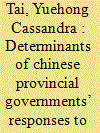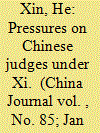| Srl | Item |
| 1 |
ID:
186406


|
|
|
|
|
| Summary/Abstract |
Scholars who study governance in authoritarian countries have long highlighted the importance of fiscal capacity and pressure from the central government in determining the responsiveness and policy changes of subnational governments. However, policy orientation is also important in shaping how subnational governments react to a crisis. Using provincial governments’ responses during the 2018 Chinese vaccine scandal, I find strong evidence that an emphasis on public health, as well as early responses by neighboring provinces, increased the likelihood of a quick response. Moreover, issue salience minimized the direct effect of pressure from the national government. An additional paired case study of the provinces of Hubei and Hunan shows that the importance accorded by the provincial government to public health policy was implemented at the sub-provincial level through China’s one-level-down cadre management system; it also may explain Hubei’s delay in responding to COVID-19 at an early stage.
|
|
|
|
|
|
|
|
|
|
|
|
|
|
|
|
| 2 |
ID:
190457


|
|
|
|
|
| Summary/Abstract |
Governance is essentially a dynamic mechanism to promote collective action for the common good. The Chinese concept of the public/common (gōnggòng) and its political philosophy of Grand Union governance provide an alternative perspective for understanding such dynamics from the unit of family through institutions to the state-embedded society. Three critical arguments with interconnected elements are analysed: governance as a dynamic mechanism; review of the historical, philosophical and political legacy of Chinese governance; and proposal of a framework for governance of the Grand Union. It concludes that ‘Chinese characteristics’, such as diverse adaptations, gradual flexibility, experimental pragmatism, and polycentric balance with a strong central state are all deeply rooted in its pre-revolutionary ancien régime. In order to understand these seemingly different institutions and values, we need to revisit their original functionality of governing for the common good.
|
|
|
|
|
|
|
|
|
|
|
|
|
|
|
|
| 3 |
ID:
177962


|
|
|
|
|
| Summary/Abstract |
Drawing on interviews with Chinese judges, this paper reveals the major effects of judicial reforms during the past half decade. It focuses on the ramifications of a new quota and responsibility system for judges and on the strengthening of central-government controls over the judiciary. The paper differentiates between what the Party considers to be legitimate and illegitimate influences on judges, which sheds light on recent legal developments and the role of the judiciary in Chinese governance. The article finds that illegitimate influences on courts have declined palpably, but what the Party perceives to be legitimate influences have persisted and even been reinforced. More direct, comprehensive control over judges has replaced previously fragmented, multilayered mechanisms. Despite important changes, the reforms did not lead to institutional independence of Chinese judges, nor has the stature of the courts in China’s political landscape changed.
|
|
|
|
|
|
|
|
|
|
|
|
|
|
|
|